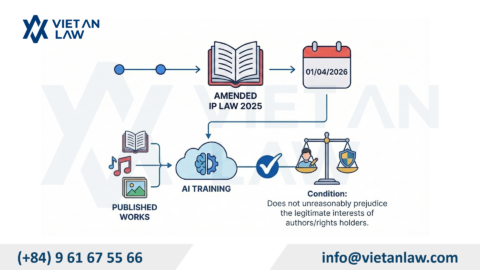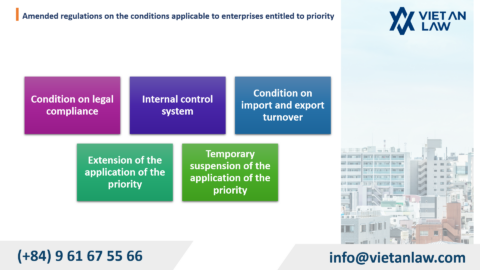With the innovations in the provisions of the Vietnam Intellectual Property Law 2022, as guided by Decree 65/2023/ND-CP, regulations on sanctions for administrative violations in the field of industrial property being regulated by Decree 99/2013/ND-CP (amended and supplemented by Decree 126/2021/ND-CP) also needs to be updated to be more suitable. Recently, on 04/05/2024, the Government issued Decree 46/2024/ND-CP amending industrial property administrative sanctions in Vietnam. This Decree will take effect from 01/07/2024 with notable points presented by Viet An Law in the article below.

Previously, Decree 99/2013/ND-CP referred to the Law on Handling Administrative Violations 2012 when determining subjects subject to sanctions where the subject infringing was a dependent unit of legal entities such as branches, representative offices, and business locations. However, this Law does not yet regulate this issue. That will only be specifically guided until 2021 in Decree 118/2021/ND-CP. Specifically, the new regulations are amended as follows:
| Case | Subject was punished | Fines |
| Dependent units commit administrative violations within the scope and time limit authorized by legal entities or organizations or under the direction, administration, assignment, or approval of legal entities or organizations. | Entities (enterprises) with dependent units | Fines apply to organizations for activities carried out by branches, representative offices, or business locations of that legal entity or organization. |
| The dependent unit commits an administrative violation outside the scope or term of authorization. | Branches, representative offices, business locations | Penalties apply to organizations for activities carried out by branches, representative offices, and business locations. |
The penalty regulations only apply measures to change information or return domain names, clearly revealing inadequacies in practice when the IP owners of infringing activities on domain names (typically infringing on trademarks contained in domain names), are all famous names and have their official domain name system. Thus, returning or changing information about the trademark owner is not necessary. Meanwhile, the urgent and necessary revocation of domain names to avoid damage to trademark owners has not been regulated. Therefore, the supplement by Decree 46/2024/ND-CP related to this measure in Article 3.3(a) of Decree 99/2013/ND-CP is reasonable.
Also in Article 3, previously this measure applied to raw materials, materials, and means mainly used for production, business, and infringing goods, then under the new Decree it only applies to infringed goods.
For this remedial measure, the new decree requires the agency handling administrative violations to send the issued decision to the relevant parties and the Business Registration Agency where the enterprise’s headquarters is located to create a more proactive mechanism in coordinating the implementation of sanctioning decisions.
The measure of revocation of the Enterprise Registration Certificate is no longer applicable, instead, the enterprise will be forced to enforce the name change in case of failure to carry out procedures within 60 days from the effective date of the sanction decision as prescribed by law. The enforcement notice between the sanctioning agency and Business Registration Agency will be made within 10 days from the expiry of the time limit for the implementation of the decision and transmitted to the enterprise by a notice requesting an explanation report within the next 05 days from the date of receipt of the enforcement notice.
Decree 46/2024/ND-CP has supplemented regulations on the implementation of several remedial measures in Clauses 5, 6, 7, 8, 9, Article 31 of Decree 99/2013/ND-CP To resolve the current situation of stagnation in the implementation of penalty decisions as follows:
| Applied remedial measure | Implementation guide after expiration |
| Forced removal from Vietnamese territory or forced re-export of material evidence and means of administrative violations | Forced destruction of evidence and means of administrative violations. |
| Forced distribution or non-commercial use of counterfeit goods | Coercive implementation |
| Forced addition of instructions on industrial property | Coercive implementation |
| Forced to return papers and documents that have been erased or altered to falsify the content | Forcibly return it to the competent authority or person that issued it |
| Forced to pay compensation equivalent to the price of transfer of use rights | Forced payment to the owner |
This provision is specifically designed to supplement the handling of industrial property administrative violations to meet the reality of intellectual property violations related to domain names in the digital era. The regulations are specified as follows:
Faced with the situation of illegally using domain names containing protected industrial property objects (mainly trademarks), it is essential to prevent infringement promptly before going deeper into the sanction decision-making process.
Decree 65/2023/ND-CP detailing several articles and measures to implement the Intellectual Property Law on industrial property has been promulgated and stipulated that this principle applies specifically to industry property in Article 95. Therefore, Clause 3, Article 4 of Decree 99/2023/ND-CP also needs to be updated to replace the general rules specified in the previous Law on Handling of Administrative Violations.
Specifically, according to the new regulations, the value of infringing goods is determined by the infringement handling agency at the time the infringement occurs and is based on the following bases in the following order of priority : (i) Listed price; (ii) Actual sale price; (iii) Aggregate costs of the infringing goods, if not yet in circulated; (iv) Purchase price.
Licensing a trademark or transferring the right to use a trademark is a common activity in the field of intellectual property, but there are no specific sanctions for violations of regulations governing this activity. Accordingly, Article 6 of Decree 99/2013/ND-CP has been updated to constitute a violation at Point c, Clause 1. The new regulations point out that non-compliance with the form of license contracts (newly added regulations) and with regulations on instructions for goods produced under trademark license contracts (retained original regulations in the old decree) is a violation of regulations governing the transfer of trademark use rights.
The fine for the above behavior is 10,000,000 VND to 20,000,000 VND for individuals, and double the fine for organizations. At the same time, the violator must also remedy by:
As stipulated in Article 130.1(d) of the Intellectual Property Law 2005, amended and supplemented in 2022, the act of “Possessing, using domain names identical with or confusingly similar to protected trademarks or trade names of others, or geographical indications without having the right to use for profits or malicious intents” is an unfair competition in industrial property has just been amended according to the Intellectual Property Law 2022.
Accordingly, the regulations on administrative sanctions in Decree 99/2013/ND-CP only mention the act of ” registering, seizing the right to use or using domain names” under the previous IP Law. Therefore, Decree 46/2024/ND-CP has amended the provisions in Article 14.16(a) on constituting the above acts to comply with the provisions of the newly promulgated Intellectual Property Law. The act of appropriation has a broader scope and covers actual acts of infringement of industrial property rights related to domain names than the old regulations because in many cases the subject of the infringement is not the person registering the domain name. At the same time, the new regulations only require proof of the violator’s “bad faith” to be sufficient, such as in cases of trademark speculation, and are not limited to the purpose of “possessing domain name” according to previous regulations.
Article 22 of Decree 99/2013/ND-CP previously only stipulated subjects with the right to request violation handling without mentioning other objective factors. Regulations in Decree 46/2024/ND-CP clearly define the grounds for verifying violations and only one of the above grounds is needed to be able to impose actual sanctions, including:
Article 25 of Decree 46/2024/ND-CP requires that the application must clearly state the name of the agency receiving the application in case it is sent to multiple agencies with the same authority. At the same time, the authority will belong to the agency that accepts the application earliest, placing the obligation of refusing to accept the application on the remaining agencies according to Clause 1, Article 28 of the newly added Decree.
The deadlines for receiving and processing new applications established in Decree 46/2024/ND-CP include:
Complaints and disputes arise after the request is received, but there are no regulations on handling procedures. Therefore, Decree 46/2024/ND-CP has added Clause 4 in Article 25 regarding this process, specifically, the application receiving agency will perform the following steps:
In case the application has not been accepted, the receiving agency will refuse to accept the application according to the provisions of Article 28 of Decree 99/2013/ND-CP, newly amended and supplemented to be compatible with the new Decree.
Accordingly, this regulation has created a coordination mechanism to promptly resolve requests of intellectual property rights holders for ongoing acts of infringement in the event of related complaints and disputes arising, which will contribute to significantly reducing the shifting of responsibility and stagnation in the handling of administrative violations by state agencies.
Decree 46/2024/ND-CP has added at Point d, Clause 2, Article 28 of Decree 99/2013/ND-CP cases that must stop processing in addition to cases where disputes arise and there is not enough basis or there is a notice of withdrawal of the request that is:
“d) The parties agree to resolve the case according to the provisions of Clause 2, Article 27 of the Decree”.
Accordingly, this measure must ensure: (i) conformity with legal regulations on intellectual property, (ii) not affect the rights and interests of third parties, consumers and society, then the agency receiving the new application has a basis to record and stop handling the request.
At the same time, the Decree also expands the regulations on continuing to process applications despite notice of withdrawal from the requesting subject as previously stipulated in Clause 3, Article 28. Specifically, instead of only applying to acts of trademark and geographical indications counterfeiting, the new regulations apply to all acts of infringement with the condition that “there is a basis to determine that the act of infringement is administrative violations “.
The authorization mechanism was stipulated in Article 23 of the previous Decree 99/2013/ND-CP but has been regulated in detail according to the provisions of Decree 46/2024/ND-CP. Accordingly, industrial property rights holders can authorize (i) the head of their representative office, branch, or agent or (ii) an industrial property representative in Vietnam to request infringement processing. However, it should be noted that the scope of authorization only includes filing applications, and does not include representative exchanges with competent authorities.
Above are some notes of Decree 46/2024/ND-CP amending industrial property administrative sanctions. If you need to use Viet An Law’s intellectual property legal consulting services, please contact us via the information below for direct support.




